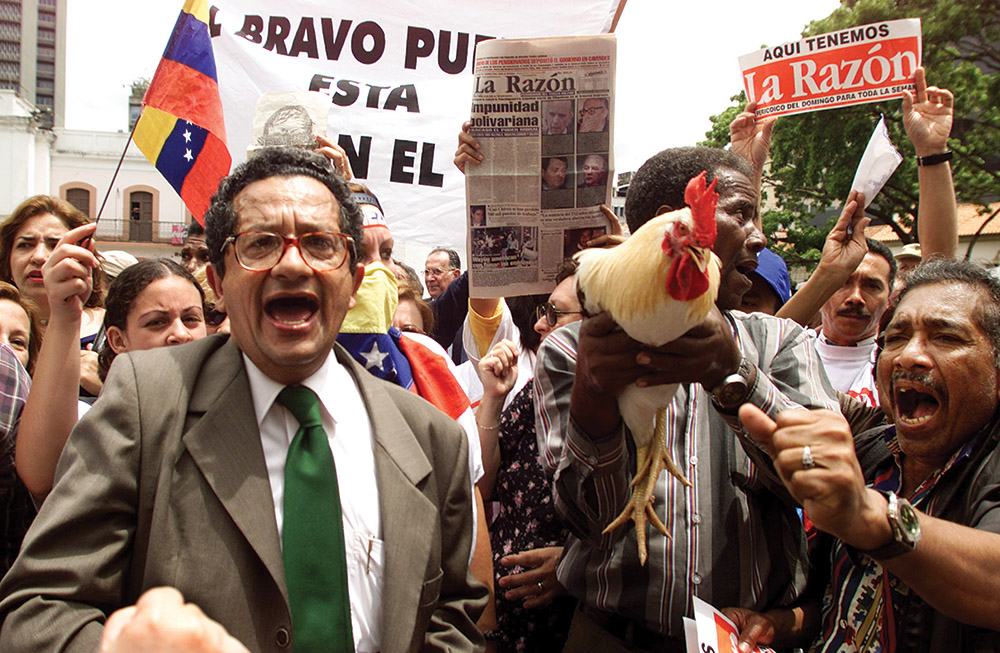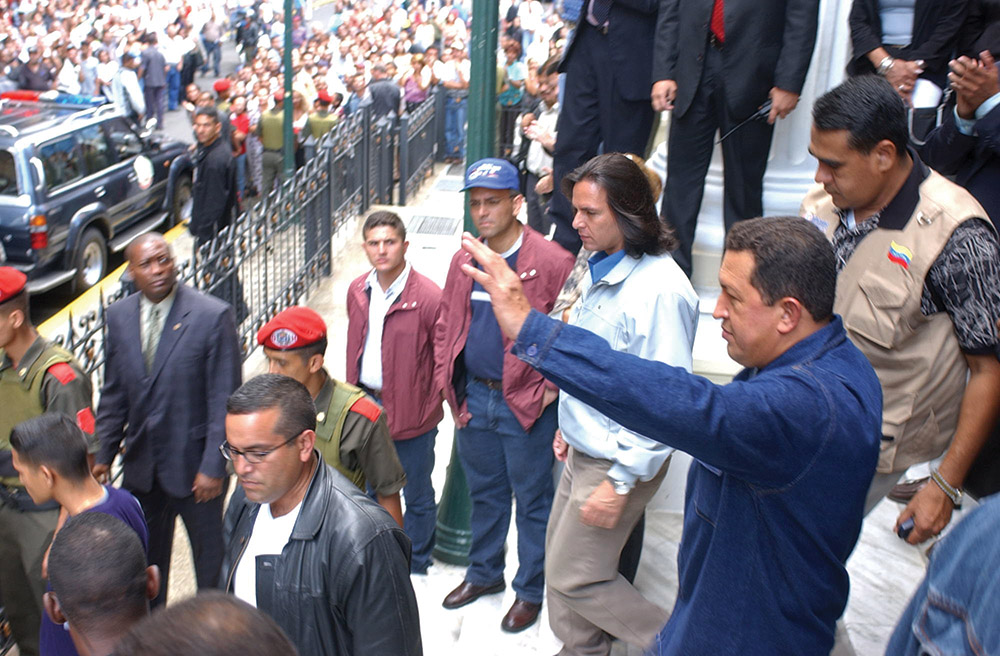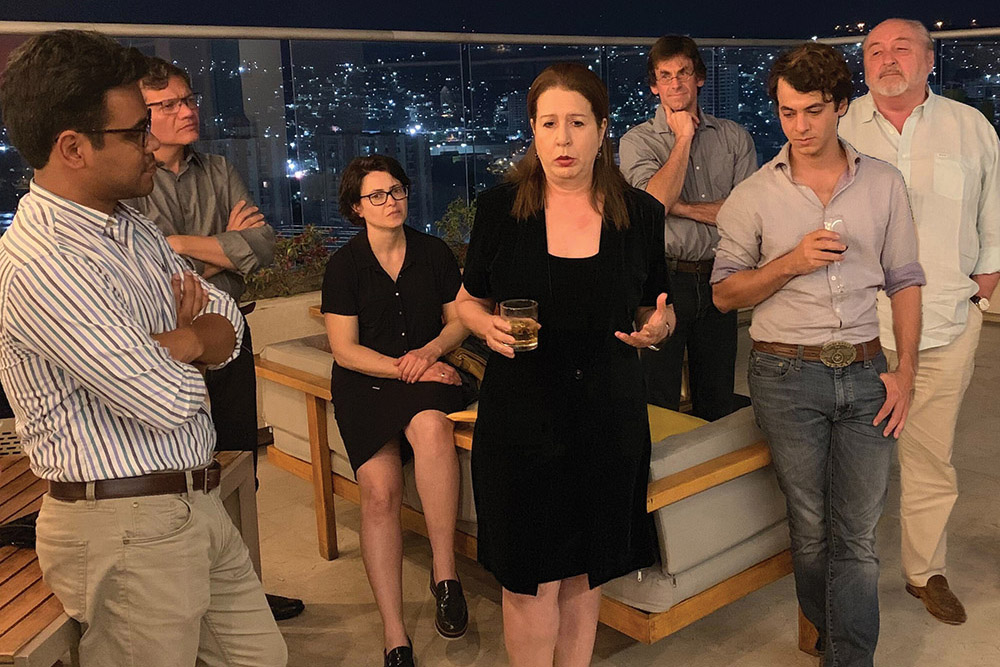Mass Violence and Atrocities | Selected Article
A Venezuelan Life: The Evolution of Journalism Under Chávez
The author offers a firsthand account of the challenges faced by Venezuelan journalists, begun under Chávez.
“Of course! I am Bertha Mason here.” That assertion and the inevitable question “Who is Bertha Mason?” both came to my mind as soon as I woke up on a chilly quarantine morning in Aarhus, Denmark.
The sudden certainty of being Bertha Mason hit me while bobbing around in the sea of sleepiness seconds before drifting off. A slow, slippery wave, as if made from an egg white, brought me the conviction before dragging it back out again, as absurd as a silver baby rattle left amid the fragments of a shipwreck on the shore. Once awake, a moment of confusion struck me: who was Bertha Mason after all?
As I sipped the last of my coffee, it dawned on me as though someone had just read me my fortune: the madwoman in the attic. Bertha Mason was Mr. Rochester’s first wife in Charlotte Brontë’s 1847 novel Jane Eyre, a book that deeply impacted me when I first read it at age 12.
So, here, I am Bertha Mason—that is to say, taking refuge from Venezuela in Scandinavia, where dawn has suddenly begun to arrive before five in the morning (considering that until recently, we lived in the empire of the night, where darkness fell at five in the afternoon and lingered well into the morning). In this country—with this damn language I’m never going to learn, and where the people speak with such trust in the authorities that at first I was confused and thought it a joke—I’m Bertha Mason. By the time I turned on the tap to run water over my mug, I already knew that my imagination was unfolding a riddle before me, not as an invitation to explore my possible insanity or any hidden desires to become an ex-wife, but to illustrate that I am Bertha Mason because I am a foreigner. More specifically, I am Caribbean, just like her.
I did not become Bertha Mason in my Danish refuge, which could not have been more comfortable and secure. The literary character came to my mind after waking up here one morning—and she has helped me connect with my reality. You see, I was Bertha Mason before the quarantine, and even before leaving my country.
Here, I am able to recognize myself as Bertha Mason. I can see clearly—and even with good humor—that in Venezuela, part of me was driven crazy (or at least labeled as such), isolated socially, declared unstable, and, therefore, considered dangerous.
And I am Bertha Mason because I am a Venezuelan journalist, trained in the democratic tradition of my country, where journalists are expected—among other things—to scrutinize those in power, to challenge them, to be their checks and balances when institutions fail to do so.

(Reuters/Kimberly White)
Recognizing the Truth
Almost 120 years after the publication of Jane Eyre, Dominican novelist Jean Rhys took Bronte’s madwoman in the attic and created a story for her with background, infusing her with humanness. We learned many truths about that madwoman in the attic when she was finally given a voice by Rhys in Wide Sargasso Sea: that her real name was Antoinette Cosway, not Bertha Mason, and that her insanity and instability were caused by abuse, manipulation, and having her home destroyed by fire, not—as we were first led to believe—by some genetic inheritance.
Venezuelan journalists, especially the older generation, those of us who were already journalists when Hugo Chávez came to power, witnessed the systematic, progressive, and meticulous demolition of our country, set ablaze by a regime that gained access to power thanks to the scaffolding of democracy. Chávez came to the presidency of Venezuela to annihilate it all under the pretense of erecting a utopia on ravaged land. So he said. In so many words. Journalists documented it, columnists analyzed it and tried to dismantle the discourse to unveil its perverse nature, narrators exposed it in the form of a metaphor or using stark imagery. We knew it all along. It was crystal clear to us. No Venezuelan journalists can say that they were deceived, that they were confused by some slogan, or that a gesture of the leader sparked a mythical illusion inside them.
The annihilation was reported as news, warned about as a chronicle, denounced in articles, illustrated with figures contributed by experts, disseminated together with testimonies of the victims. However, at the same time, official sources went from opaque to impenetrable and, from there, to utterly deceitful and propagandistic. News outlets started to self-censor, and those that did not gradually decreased the number of pages in their publications until they closed down. Or until they were shut down by the regime.
By that time, everything in Venezuela had been renamed, starting with the country itself. Lieutenant Colonel Hugo Chávez came to power in early 1999, and in November that year, the National Constituent Assembly—which Chavez ran as he pleased—approved the change of name of the country to the Bolivarian Republic of Venezuela, inevitably evoking other names such as the Islamic Republic or the Soviet Socialist Republic. Nobody changes your name if they want you to continue to be who you are. This hypothesis would be confirmed soon enough.

Photo by @andreinamujica
Mainstream Collapse
In 2001, Chávez mentioned that there was a “historic clash of forces” between the media and the power structure. This comment was a threat. A wave of persecution was launched against the media, including the imprisonment of journalists and publishers, the closing of certain media outlets, and the acquisition of others by Chávez-supporting businessmen, who transformed the newly acquired newspapers and TV stations into propaganda broadcasters.
Journalism as a profession then took another blow, one related to the quality of jobs. With the exception of some radio and television celebrities, whose income—which can be quite high in some cases—comes largely from advertising revenue rather than from their journalistic work, this profession has been historically underpaid in Venezuela. Journalists would typically start their career paths as “street” reporters, as we refer in Venezuela to journalists looking for news stories for daily media, be they newspapers or radio and television newscasts. After completing a decade doing this type of work, a journalist would accept a managerial position in the newsroom and then, not long after that, move toward corporate communications in search of more-secure and better-paid employment. However, this prospect would soon vanish into thin air. With notably rare exceptions, the communications departments of banks and large companies lost their appeal for journalists willing to give up their journalism work in pursuit of a grown-up’s salary, end-of-year bonuses, and housing benefits.
And then came the major aftershock. The main traditional media collapsed, going bankrupt as a result of the lack of advertising; changing their very nature by being excessively cautious in an effort to adjust to the restrictions imposed by the dictatorship; and becoming detached from their audience, whose skepticism grew more and more because, among other things, their credibility was raucously shattered to pieces due to polarization (we would learn the hard way that in an authoritarian regime, truth is no longer the opposite of falsehood but rather of polarization). And of course, there came a time when there was no paper or ink to print newspapers or magazines with.
We journalists became jacks of all trades, or “mata-tigres,” a term used in Venezuela to refer to musicians who add to their salaries by taking gigs that are not part of their contracts, so they end up playing at parties, weddings, bar mitzvahs, etc. In order to make ends meet, we would juggle four or more jobs at a time. Some of us were hired to ghostwrite undergraduate degree theses by shameless students with extra cash to spare; we wrote corporate reports (for companies that had been forced to dismantle their Public Relations departments); we wrote entire magazines for medical practices; and we served as local correspondents for foreign media that snapped up tremendous talent for peanuts. I did so many things myself that when I submitted my résumé in Mexico to a potential employer, he asked me incredulously how many lives I had led to have been able to be a journalist, novelist, children’s book author, TV script writer, publisher, ghostwriter, creative writing professor, translator, radio interviewer . . .
One. But then again, this is the life of a Venezuelan.

The “Other”
We Venezuelan journalists have had to battle against many adversaries at once: censorship, government persecution, job precariousness, hyperinflation, lack of social security, dreadful internet service, closing of official sources.
Many saw no other way out but exile. And some opted for entrepreneurship. They created online media that have become a reference point for information thanks to their integrity and credibility. There is even an offline media, called Bus TV, based on an idea that is so simple it has to be explained: journalists board a public transportation bus, and while one of them holds a TV-shaped cardboard frame, another peeks through it and delivers news bulletins, which have been researched and written based on the editorial concept of this community-focused media. They had to form alliances to resist and survive because, as Director of Bus TV Laura Helena Castillo puts it, “alone, we are crushed.”
For my part, I accepted the temporary safe haven offered to me by this generous city, where I have discovered what it is like to live without fear and, indeed, to wake up to foreign ideas, perhaps favored by a frightless night’s sleep.
But the limitations and adversaries Venezuelan journalists live under have certainly left broad segments of the Venezuelan population devoid of information. Certain sectors have access to nothing but official propaganda. However, all in all, Venezuelan journalism has been strengthened; proof of this is the abundance of international awards it has reaped against all odds.
Meanwhile, the spokespeople of the dictatorship, as well as the army of trolls at their service, have continued to harass, threaten, and beat journalists and steal their cell phones and professional equipment. All of this has escalated. For my part, almost from day one I was subjected to the Chavismo wrath, which, at least at the beginning, was targeted more fiercely against women. Against dissident women. Our reluctance to worship Chávez could only be understood as some severe psychological condition on our part, both to Chávez and to his followers, so they wasted no time before labeling us mad. Mad and “unpatriotic,” a term foisted by Chavismo on the opposition and relentlessly used by Chávez.
The country had been physically devastated, and our aspirations to advance democracy and complete the long-sought modernity project had been mired. Under an authoritarian regime, like in the colonial England of the novel Jane Eyre, the “other” must be confined and silenced. What the “other” says makes no sense. They are not logical arguments but desperate cries. And if—on top of it all—the “other” is a woman who dares to rise up against the supreme leader, she cannot be anything other than a madwoman.
Milagros Socorro is a renowned Venezuelan journalist, writer, and university professor. She is the winner of the 1999 Venezuelan National Journalism Prize. In 2018, she received the Oxfam Novib/PEN Award for Freedom of Expression, given to journalists who have been persecuted for their work and continue working despite the consequences.
The current humanitarian, political, and economic crisis in Venezuela has escalated the incidence of violence, acute shortage of food and essential goods, and violation of human rights—including the right to information provided by a free and independent press. As part of our commitment to fostering regional collaboration on critical issues, the center works with La Coordinadora Regional de Investigaciones Económicas y Sociales (CRIES) to convene the Latin American and Caribbean civil society forum for the prevention of mass violence. The author’s firsthand accounts of the challenges faced by Venezuelan journalists informed the forum’s April 2019 workshop in Cúcuta, Colombia—a border city with Venezuela and focal point for the migration crisis.
